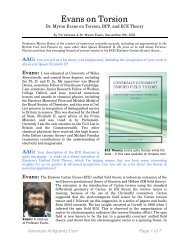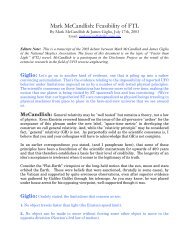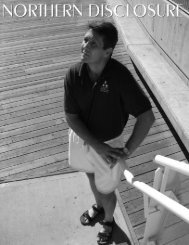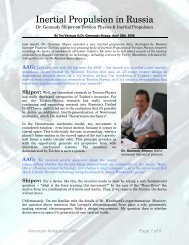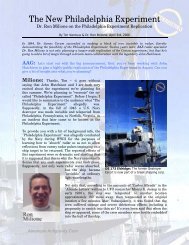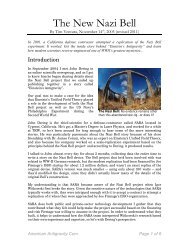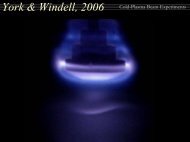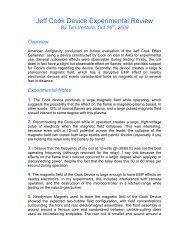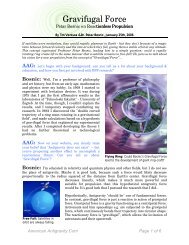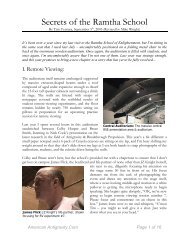Sharon-Weinberger-In.. - American Antigravity
Sharon-Weinberger-In.. - American Antigravity
Sharon-Weinberger-In.. - American Antigravity
You also want an ePaper? Increase the reach of your titles
YUMPU automatically turns print PDFs into web optimized ePapers that Google loves.
VAPORWAR<br />
<strong>Sharon</strong> <strong>Weinberger</strong> on the Pentagon's Imaginary Weapons<br />
By Tim Ventura and <strong>Sharon</strong> <strong>Weinberger</strong>, June 19th, 2006<br />
It's called a “hafnium bomb”, and it uses a new type of stimulated nuclear isomer technology so deadly<br />
that the Pentagon doesn't want you to even know that it exists -- and according to <strong>Sharon</strong> <strong>Weinberger</strong>,<br />
it doesn't. We join the intrepid editor of Aviation Week's Defense Technology <strong>In</strong>ternational as she takes<br />
us on a journey through the Pentagon's scientific underworld...<br />
AAG: Let's start out with a bit of background information: you're an experienced defenseindustry<br />
reporter and editor with lots of experience covering the latest trends in military<br />
technology. However, it appears that your new book, "Imaginary Weapons", goes in a radically<br />
new direction with a focus on overhyped vaporware defense technologies. I'm wondering if you<br />
could start us out with a bit about your personal background, and what really inspired you to<br />
begin writing this book?<br />
<strong>Weinberger</strong>: I have some background in<br />
national security studies, but I really stumbled into<br />
defense reporting when I moved to Washington<br />
after graduate school. I was looking, like all<br />
newcomers to DC, to find work that didn’t involve<br />
toting someone else’s briefcase. I eventually ended<br />
up working for a small Beltway company doing<br />
research and analysis for the Pentagon. I worked<br />
with some incredibly intelligent and thoughtful<br />
people, and went from there into defense<br />
journalism.<br />
One of the things I learned from that experience is<br />
that the defense industry is itself an “underworld”<br />
in many ways, and I try to give readers a feel for<br />
this is my book. I remember sitting in the office of<br />
the head of the defense company I was working<br />
at—the CEO started talking about the fallout<br />
shelter in his backyard, and lecturing me on how<br />
much dirt you need over your fallout shelter to<br />
protect against radiation, and what wind patterns<br />
mean for radioactive fallout. I suddenly realized<br />
how absolutely weird the conversation was, and yet<br />
not so weird for those in the defense industry. We<br />
were discussing fallout shelters the way other<br />
people discuss barbeques. When you reside in an<br />
“underworld,” it seems so normal, but if you step<br />
back and look at it as an outsider, then you’re<br />
struck by how perverse it all is.<br />
Imaginary Weapons: A journey through<br />
the Pentagon’s scientific underworld.<br />
<strong>American</strong> <strong>Antigravity</strong>.Com Page 2 of 11



